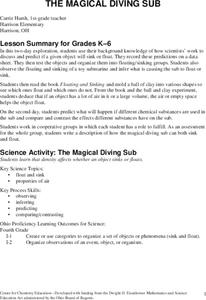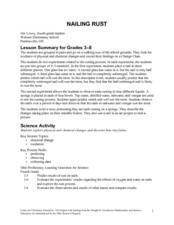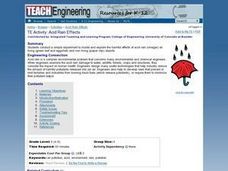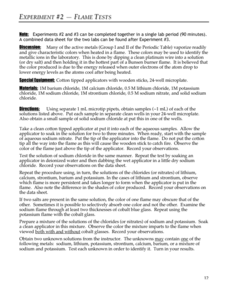Curated OER
Iron For Breakfast
Third graders are challenged to use scientific thinking, they experiment and observe which objects are attracted to a magnet. Pupils use the evidence to construct an explanation as to what common property the objects attracted to a...
Curated OER
Magic Color
First graders discover that a chemical reaction is responsible for the effects seen with Crayola Color Wonder markers. They observe that the color changes are the result of a chemical reaction between chemicals in the Color Wonder paper...
Curated OER
The Magical Diving Sub
First graders discuss and predict if a given object sinks or floats. They record their predictions on a data sheet. Pupils test the objects and organize them into floating/sinking groups. Students observe the floating and sinking of a...
Curated OER
Nailing Rust
When your upper elementary or middle school class is learning about chemical changes, these activities help demonstrate the concepts. In Part A, they submerge and place a nail partially underwater, then after a week they make...
Curated OER
Acid Rain Effects
Get out the goggles and conduct a simple experiment to model and explore the harmful effects of acid rain (vinegar) on living (green leaf and eggshell) and non-living (paper clip) objects. Young chemists observe and describe the harmful...
Curated OER
Bug's Eye View
Investigate the life of bugs and how they interact with the environment in this integrated science and language arts lesson plan. Young scientists construct mini environments in cages in order to make observations. This data forms the...
Curated OER
Species and Specimens: Exploring Local Biodiversity
Students practice skills essential to all scientific investigation: carefully observing and collecting data. They become field biologists in a series of hands-on activities to collect and identify specimens, and survey and calculate the...
Curated OER
Microscopic Water Life
Students use a light microscope to observe the organisms living in a sample of ocean or fresh water. Students create a drawing of the organisms that they observe. Students then discuss the different body plans of the organisms and the...
Curated OER
The Properties of Water: "Dead Or Alive"
Young scholars study the water cycle and create a booklet entitled: "Discover the Wonder of Water" They observe and record data regarding evaporation, condensation, and precipitation and how water moves from a solid to a liquid to a gas....
Curated OER
The Parachute
Students discuss parachutes and write a procedure to determine the effect of different size parachutes and different masses on the time it takes the masses to fall. They record all their data from their experiment then write three...
Curated OER
Deformed Frogs! - The Parasite Hypothesis
This project provides young scholars the opportunity to investigate parasites as a possible cause of the observed frog deformities. It asks students to view web-based evidence and interpret whether it supports the parasite hypothesis....
Curated OER
Fossils!
Learners explore what fossils are, how they are formed, what different types there are and why they are significant to both our present and past geology history. They participate in a hands on fossil observation of their choice and...
Curated OER
Biomes and Plant Growth
Seventh graders design four biomes models and plant three types of seeds in them to observe growth. In groups for each type of biome, they predict the seeds' growth in each of the settings. Students follow the conditions on a biome chart...
Curated OER
Solar Car Series: during What Part of the Day Can the Most Sun Power Be Collected?
In preparation for solar car races, middle schoolers attempt to discover what time of day the most solar energy can be collected. Begin by demonstrating the use of a voltmeter for measuring solar cell output. Take them outdoors to take...
Curated OER
Flame Tests
Learners perform flame tests on 12 elements. In this flame tests lesson plan, students experiment with elements to observe their visible light spectra emitted as electrons jump from one energy level to another. Learners record their...
Pingry School
Flame Tests
Light a fire in your pupils! Scholars conduct a flame test and observe the emission spectra of several different salts in an enlightening hands-on investigation. They use their observations to make comparisons and conclusions about the...
Curated OER
Can Young Children Distinguish Between Living and Non-living Things?
What does it mean to be living? Help your young scientists identify living and non-living things as a result of their learning through discovery. Observation of and interaction with a set of natural phenomena in their community will make...
Curated OER
Life Cycle of a Monarch Butterfly
Students identify the stage of the butterfly's life cycle. In this life cycles lesson, students create a KWL chart about monarch butterflies. Students observe monarch caterpillars in an aquarium and identify the various stages of growth.
Curated OER
Community Action
Fifth graders decide how one uses resources within a particular bioregion. For this decision making lesson, 5th graders consider the biodiversity and complexity of the ecosystem. Students select a resource (water, paper, electricity)...
Curated OER
Parachute Drop
Learners will have fun creating a parachute to collect data with. They will construct the parachute in small groups, measure the materials, and create an observation sheet. Then they drop the parachute and make predictions about how long...
Curated OER
Where are Koalas on the Food Chain?
Take a field trip to observe Koalas, absolutely! Budding scientists become familiar with the Koala's position in the food chain. They answer questions based on what they see and draw a food chain explaining the Koalas position. Tip: A...
Curated OER
Coloring the Life Cycle of Fruits and Vegetables
Students investigate how fruits and vegetables change and grow. In this life cycle of fruits and vegetables lesson, students observe the changes in fruits and vegetables as they grow and record the colors on a worksheet.
Curated OER
Cell Biology
Identify the different cell organelles in prokaryotes. Modelling the cells using Jell-o and candies will be a fun way to experience the cell in a hands-on way (different to using play-doh!). They observe cells under a microscope and draw...
John F. Kennedy Presidential Library & Museum
Picture It: JFK in High School
Elementary schoolers learn about young John F. Kennedy. After a teacher-led discussion about his high school years, pupils examine a photograph of Kennedy and four of his friends taken on the grounds of the Choate School in Connecticut....
Other popular searches
- Observation and Inferences
- Observation Skills
- Student Teacher Observation
- Observation Inference
- Making Observations
- Scientific Observation
- Inference and Observation
- Observation Log
- Weather Observation Chart
- Observations and Inferences
- Direct Observation
- Science Observation Skills

























